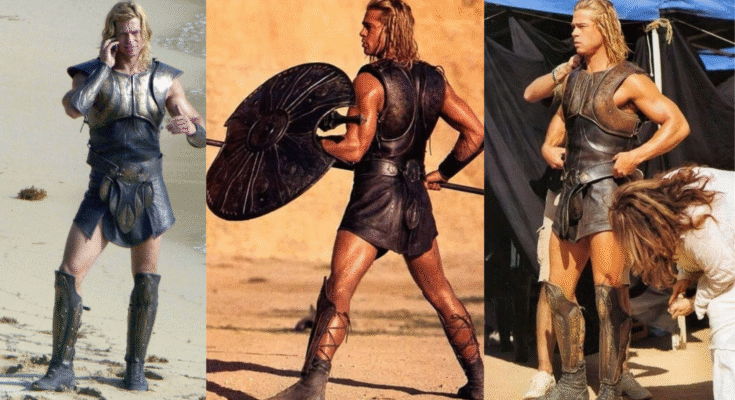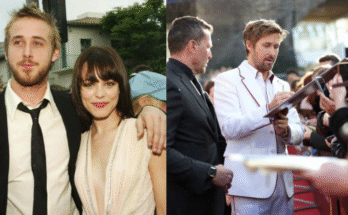From Chicken Suit to Icon: A Journey of Reinvention
William Bradley Pitt (born December 18, 1963) is an American actor and film producer. In a film career spanning more than thirty years, Pitt has received numerous accolades, including two Academy Awards, two British Academy Film Awards, two Golden Globe Awards, and two Primetime Emmy Awards. Films in which he has appeared have grossed over $9.4 billion worldwide.
Yet these extraordinary statistics barely scratch the surface of who Brad Pitt is or what he represents in cinema. More than just a movie star with a perfect jawline and magnetic charm, Pitt is a consummate craftsman—an actor who refused to be confined by beauty or stereotype, and who evolved into one of cinema’s most interesting producers. His story is one of ruthless ambition, deliberate artistic choices, and a commitment to expanding the boundaries of what a leading man can do on screen.
The Unlikely Beginning: From Springfield to the Chicken Suit
Brad Pitt grew up in Springfield, Missouri, and attended (1983–87) the University of Missouri before dropping out just short of graduation to move to California and pursue an acting career. This single decision—walking away from university just weeks before graduation—reveals something essential about Brad Pitt’s character. He wasn’t afraid of risk. He wasn’t interested in the safe path.
The early years in Los Angeles were anything but glamorous. Before he became successful at acting, Pitt supported himself by driving strippers in limos, moving refrigerators and dressing as a giant chicken while working for El Pollo Loco. This image—the future global superstar dressed as a giant chicken, moving refrigerators to pay rent—is crucial to understanding Pitt’s mentality. He did whatever was necessary to survive while pursuing his dream. He wasn’t too proud. He wasn’t waiting for the world to hand him anything.
His early credits were uncredited roles in significant productions. His earliest credited roles were in television, starting on the daytime soap opera Another World (1964) before appearing in the recurring role of Randy on the legendary prime time soap opera Dallas (1978). These were minor roles in minor productions—the essential precursor to stardom that most people never know about. They were the grunt work of acting.
The Breakthrough: Thelma & Louise and the Making of a Star
He gained recognition in Thelma & Louise (1991), A River Runs Through It (1992), Cool World (1992) and Kalifornia (1993). But Thelma & Louise was the role that changed everything.
Pitt first gained recognition as a cowboy hitchhiker in the Ridley Scott road film Thelma & Louise (1991). In the hands of director Ridley Scott and in a film that would become a cultural milestone, Pitt played J.D.—a sexy, charismatic criminal who seduces Geena Davis’s character and steals her money. The role was small, but it was electric. Pitt brought such charm, such magnetism, such dangerous sexuality to the part that audiences couldn’t take their eyes off him.
This is crucial: Pitt’s breakthrough wasn’t in a lead role. It was a supporting part that he absolutely commanded. The film wasn’t about him, but after the movie ended, everyone remembered him. This pattern—choosing roles that matter, even when they’re small—would define his entire career.

The success of Thelma & Louise immediately positioned Pitt as a leading man. Hollywood rushed him scripts. Studios wanted to build films around his face. This is where many actors get trapped. They accept whatever is offered because the offers are plentiful and lucrative. Pitt did something different.
Early Leading Roles: Refusing to Be Typecast
Pitt’s subsequent projects were as quirky and varied in tone as his performances, ranging from his unforgettably comic cameo as stoner roommate Floyd in True Romance (1993) to romantic roles in such visually lavish films as Interview with the Vampire (1994) and Legends of the Fall (1994), to an emotionally tortured detective in the horror-thriller Se7en (1995).
Consider this trajectory: A stoner roommate in True Romance. A vampire in Interview with the Vampire. A romantic lead in Legends of the Fall. A tormented detective in Se7en. These are not the roles of an actor trying to build a consistent brand. These are the choices of an artist determined to prove his range.
Legends of the Fall (1994)
Working with Anthony Hopkins in this epic western romance, Pitt proved he could carry a major production with one of cinema’s greatest actors. The film earned him his first Golden Globe nomination, signaling that he was more than a pretty face who had benefited from a single great role.
Se7en (1995)
Opposite Morgan Freeman, Pitt delivered one of the most critically acclaimed performances of his early career in David Fincher’s dark, devastating serial killer thriller. As Detective Mills, Pitt brought intelligence, vulnerability, and genuine emotional depth to the role. This was not the charming hitchhiker from Thelma & Louise. This was an actor committed to disappearing into character, to finding the humanity in complex, damaged people.
12 Monkeys (1995)
His portrayal of frenetic oddball Jeffrey Goines in 12 Monkeys (1995) won him a Globe for Best Performance by an Actor in a Supporting Role. Working with director Terry Gilliam in this dystopian science fiction masterpiece, Pitt delivered a performance of controlled chaos. As the deranged, manic Jeffrey Goines, Pitt showed audiences he could play against type, could be ugly and strange and brilliant. He wasn’t afraid to abandon his beauty for the demands of character.
The Golden Globe he won wasn’t a “best supporting actor” award for looking pretty. It was recognition of serious acting talent.
The Fincher Partnership: Fight Club and Beyond

Pitt reteamed with Fincher to star in the apocalyptic film Fight Club (1999) as anti-consumerist cult leader Tyler Durden, a role that required him to learn boxing, taekwondo, and grappling.
Fight Club is essential to understanding Brad Pitt’s artistic journey. The film was a critical and commercial disappointment at the time of release. Studios thought Pitt was wasting his time. He was already a star. Why take on a role in an experimental, violent, philosophically challenging film that few people would see?
Because Pitt understood something most actors don’t: sometimes the work matters more than the commercial success. Sometimes taking a risk on material you believe in is more important than playing it safe. Fight Club has since developed into a cult classic—a film that defined a generation and that people still discuss decades later.
As Tyler Durden, Pitt was simultaneously charismatic and dangerous, beautiful and violent, philosophical and psychotic. The performance required him to learn new physical skills, to understand the character’s ideology, to disappear into the role completely. It’s one of his best performances, and it remains criminally underappreciated.
The Romantic Leading Man: Ocean’s Trilogy
Pitt portrayed Rusty Ryan in the commercially successful heist film series Ocean’s Trilogy (2001–07). With these films, Pitt proved he could be the romantic lead in a blockbuster, could carry major studio productions, could have chemistry with A-list co-stars like George Clooney. The Ocean’s films were fun, commercially successful, and showcased Pitt’s charm and wit.
But even as he was enjoying massive commercial success with these films, Pitt wasn’t abandoning his commitment to challenging material.
The Curious Case of Benjamin Button and the Weight of Awards
Pitt’s chameleonic turn in the latter film earned him an Academy Award nomination for best actor. As Benjamin Button—a man who ages in reverse—Pitt delivered a subtle, nuanced performance that required him to age backward through the film, showing different stages of his character’s impossible life. The performance was praised and earned him an Oscar nomination.
In a film career spanning more than thirty years, Pitt has received numerous accolades, including two Academy Awards, two British Academy Film Awards, two Golden Globe Awards, and two Primetime Emmy Awards. But Pitt’s first acting Oscar wouldn’t come until 2020—nearly three decades into his career. This is remarkable. An actor of his caliber, with his talent, had to wait decades for Academy recognition.
The Producer: Plan B Entertainment
What’s crucial to understand about Brad Pitt is that his most significant contributions to cinema may have come behind the camera rather than in front of it.

In addition to acting, Pitt co-founded a production company in 2001 with his then-wife Jennifer Aniston and then-manager Brad Grey. Plan B Entertainment has produced many successful and award-winning movies such as The Departed (2006), 12 Years a Slave (2013), Women Talking (2022), and Wolfs (2024).
In 2013, Pitt produced the period drama 12 Years a Slave, for which he won the Academy Award for Best Picture. This Oscar for producing is particularly significant. It came years before his acting Oscar. It represents his commitment to identifying meaningful stories, championing emerging directors, and bringing important films to audiences.
Plan B Entertainment has become one of Hollywood’s most respected and important production companies. As a producer, Pitt has won more awards than he has as an actor—a striking achievement that suggests his greatest impact on cinema may lie in the projects he chooses to champion rather than the roles he chooses to play.
The Personal Life: The Jennifer Aniston Years and Beyond
Pitt married Jennifer Aniston in a highly publicized ceremony in 2000, but he met Angelina Jolie on the set of Mr. & Mrs. Smith (2005). Pitt left Aniston for Jolie in 2005, a break-up that continues to fuel tabloid stories years after its occurrence.
His departure from Aniston for Jolie became one of Hollywood’s most famous love triangles—the stuff of tabloid obsession for years. But what’s interesting about this period is what Pitt did with it artistically.
The Tarantino Connection: From Supporting Actor to Icon
After his relationship with Jolie, Pitt appeared in more cameos and supporting roles rather than leading a film. Then came Once Upon a Time in Hollywood.
Pitt starred as Cliff Booth, a stunt double, opposite Leonardo DiCaprio, in Quentin Tarantino’s 2019 film Once Upon a Time in Hollywood, reuniting with DiCaprio after The Departed, which Pitt produced and DiCaprio starred in. For his performance in the film, he received awards for Best Supporting Actor at the Academy Awards, Golden Globe Awards, BAFTA Awards, Screen Actors Guild Awards, and Critics’ Choice Movie Awards. This is the second Academy Award for Brad Pitt, his first that he received for acting.
In Once Upon a Time in Hollywood, Pitt delivered what many consider his best acting performance. As Cliff Booth—a washed-up stunt double in 1969 Los Angeles—Pitt brought charm, vulnerability, complexity, and humor to the role. The performance was so good that it finally won him the acting Oscar that had eluded him for decades.
What’s remarkable is that this Oscar-winning performance came in a supporting role. Pitt didn’t need the lead to deliver brilliant work. He was confident enough in his talent to let Leonardo DiCaprio carry the film while Pitt stole scenes with remarkable subtlety and charm.
The Variety and Versatility

Throughout his career, Pitt has demonstrated an almost unmatched ability to move between genres and character types. He’s been:
A romantic lead (Legends of the Fall)
A psychotic villain (12 Monkeys, Fight Club)
A detective (Se7en)
An action hero (Troy, Mr. & Mrs. Smith)
A heist comedy co-star (Ocean’s Trilogy)
A sophisticated dramatic actor (Babel, The Tree of Life)
A space explorer (Ad Astra)
A stunt double (Once Upon a Time in Hollywood)
Few actors can claim such genuine range. Most actors find a type and repeat it. Pitt has actively resisted being defined by any single archetype.
The Philosophy: Aging and Continued Ambition
As Pitt has aged, he’s become more selective with his roles. As he gets older, working with the people that he just really enjoy spending time with has really become important to him.

This is a fascinating evolution. Rather than desperate to maintain his star status, Pitt seems genuinely more interested in the people he works with, the stories being told, and the quality of the experience than in proving anything to anyone. He’s become comfortable enough with his legacy to be choosy about his future.
The Box Office Giant
Films in which he has appeared have grossed over $9.4 billion worldwide. This staggering number represents not just commercial success, but the breadth of his appeal. He’s been in action blockbusters that made billions, intimate character studies that made critics weep, comedies that made audiences laugh, and everything in between. Few actors can claim such diverse commercial appeal.
The Award Recognition
In a film career spanning more than thirty years, Pitt has received numerous accolades, including two Academy Awards, two British Academy Film Awards, two Golden Globe Awards, and two Primetime Emmy Awards. But perhaps more significantly, he’s been recognized with prestigious awards from the Producers Guild of America, including a Lifetime Achievement Award, suggesting that the industry recognizes his contributions extend far beyond acting.
The Complete Package: Actor, Producer, Visionary
What makes Brad Pitt exceptional isn’t that he’s the most talented actor, the most handsome star, or the most commercially successful. What makes him exceptional is his commitment to challenging himself, his willingness to take risks, his refusal to be defined by his beauty or his early roles, and his genuine interest in championing meaningful cinema through production.
He arrived in Hollywood with nothing but ambition. He dressed as a chicken and moved refrigerators. Then he took a role in a classic film, and instead of spending the next thirty years repeating it, he spent thirty years actively resisting it—choosing stranger, harder, more interesting roles. He became a producer, championing stories that matter and directors with vision.
Conclusion: The Chameleon’s Legacy
In 1991, a beautiful young man played a sexy hitchhiker in Thelma & Louise, and the world noticed. Thirty years later, that same man—now in his sixties—plays a washed-up stunt double in Once Upon a Time in Hollywood, and finally wins the acting Oscar that’s been mysteriously absent from his shelf for all those decades.
This journey—from chicken suit to cinema icon, from pretty boy to chameleon, from supporting player to major producer—represents a deliberate, thoughtful, ambitious trajectory. Brad Pitt didn’t just become a movie star. He actively crafted a career that would challenge him, expand him, and allow him to contribute meaningfully to cinema in multiple capacities.
The boy who dropped out of college two weeks before graduation to chase an impossible dream didn’t just succeed. He redefined what success could mean.
“I’m not one to look back but this has made me do so. And I think of my folks taking me to the drive-in to see Butch and Sundance and loading up my car and moving out here, and Geena [Davis] and Ridley [Scott] giving me my first shot [in Thelma & Louise], to all the wonderful people I’ve met along way to stand here now.” – Brad Pitt, Oscar Acceptance Speech (2020)
In those words lies his true philosophy: gratitude for the opportunity, awareness of the people who helped, and recognition that the journey matters more than any single achievement.



